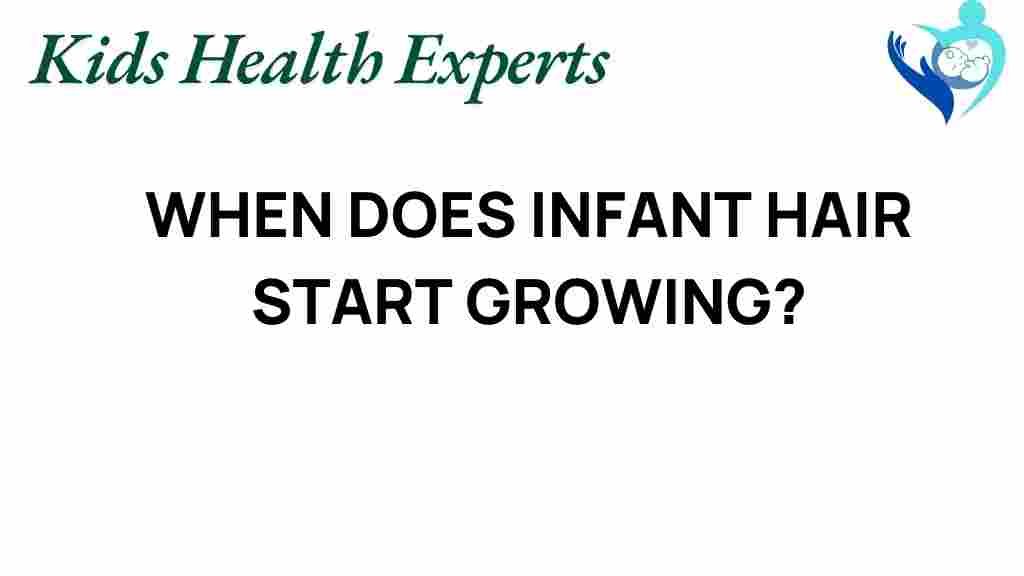Unlocking the Mystery: When Does Infant Hair Growth Begin?
The journey of newborn development is fascinating, and one of the most curious aspects for new parents is infant hair growth. Many parents wonder when their little ones will start sprouting hair and how this process unfolds. In this article, we will explore the baby hair timeline, understand how hair follicles function, and provide essential parental guidance to navigate this intriguing phase of early childhood.
Understanding Hair Follicles and Infant Hair Growth
Before diving into the specifics of newborn care, it is essential to understand what hair follicles are and how they contribute to the growth of hair in infants. Hair follicles are small, tunnel-like structures in the skin that produce hair. They are present from the time of conception and start developing early in fetal life.
During the fetal stage, hair growth begins as early as the 14th week of pregnancy, primarily in the form of lanugo, a fine, soft hair that covers the baby’s body. This hair is typically shed before or shortly after birth. Understanding this process is crucial for parents to manage their expectations regarding infant hair growth.
The Timeline of Infant Hair Growth
The baby hair timeline can vary significantly from one infant to another, but here’s a general outline of what to expect:
- Birth to 3 Months: Most newborns are born with some hair, but it can be sparse and fine. Some babies may have a full head of hair, while others may have little to none.
- 3 to 6 Months: During this period, many infants will begin to lose the fine hair they were born with, especially if they are frequently placed on their backs to sleep. This shedding is normal and should not cause concern.
- 6 to 12 Months: By this age, you may notice new hair starting to grow in. The texture may be different from the baby’s original hair, and it might be coarser or curlier.
- 1 Year and Beyond: After the first year, most children will have a fuller head of hair, and it will continue to change in texture and color as they grow.
Factors Influencing Infant Hair Growth
Several factors can influence how and when your baby’s hair grows:
- Genetics: Family history plays a significant role in the hair type and growth patterns of infants.
- Nutrition: Proper nutrition is vital for overall health, including hair growth. Ensure your baby is receiving adequate nutrients through breastfeeding or formula.
- Health Conditions: Some medical conditions can affect hair growth. If you have concerns, consult your pediatrician.
How to Care for Your Infant’s Hair
Taking care of your infant’s hair is an essential part of newborn care. Here are some tips to help you manage their hair during the early stages of development:
- Gentle Washing: Use a mild baby shampoo to wash your baby’s hair a few times a week. Avoid harsh chemicals that can irritate their sensitive scalp.
- Combing: Use a soft brush or a wide-tooth comb to detangle your baby’s hair gently. This can help prevent discomfort.
- Protecting the Scalp: Ensure that your baby’s scalp is kept clean and dry. Moisture can lead to cradle cap, a common condition in infants.
Common Concerns About Infant Hair Growth
As parents observe their baby’s hair development, they may encounter various concerns. Here are some common issues and solutions:
- Hair Loss: It’s common for babies to lose hair in the first few months. This is usually temporary, and new hair will grow in.
- Uneven Growth: Some babies may have patches of hair that grow slower than others. This is normal and typically evens out over time.
- Cradle Cap: If you notice crusty patches on your baby’s scalp, this is cradle cap. It’s generally harmless and can be treated with gentle washing and oil treatments.
Parental Guidance for Healthy Hair Growth
As a parent, you want to ensure your child has the best possible start in life, including healthy hair growth. Here are some additional parental guidance tips:
- Maintain a Balanced Diet: If you are breastfeeding, ensure you are eating a balanced diet rich in vitamins and minerals. If your child is eating solids, introduce a variety of healthy foods.
- Regular Check-ups: Regular visits to your pediatrician will help monitor your baby’s overall health and hair development.
- Be Patient: Hair growth takes time, and each child is different. Avoid comparing your baby’s hair growth to others.
Resources for Parents
For more information on newborn development and newborn care, you can explore resources such as HealthyChildren.org for expert advice tailored to parents.
Conclusion
Understanding infant hair growth can help parents navigate this fascinating aspect of newborn development. From the initial stages of hair loss to the eventual growth of a fuller head of hair, each child will have a unique experience. Remember that patience is key, and providing gentle care will promote healthy hair growth.
Whether you’re dealing with hair loss, uneven growth, or cradle cap, the insights shared in this article will guide you through these early childhood challenges. As you embark on this journey, keep in mind that every baby develops at their own pace. Enjoy the process, and cherish these precious moments with your little one!
For more detailed information about managing your baby’s health and development, check out our article on Baby Care Essentials.
This article is in the category Growth and created by KidsHealthExperts Team
